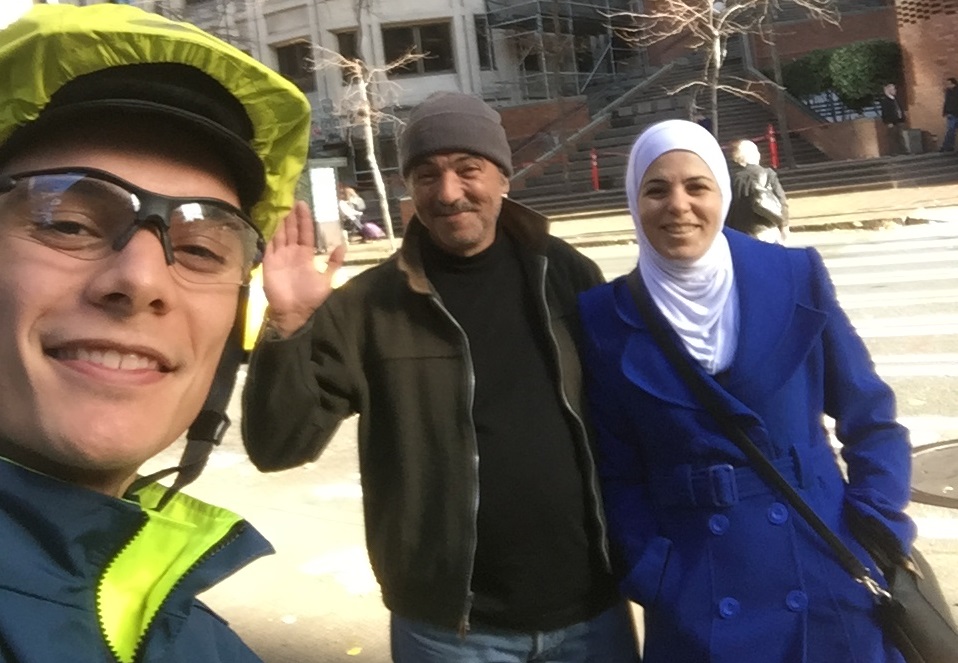News
Safety Ambassador Rises From Homeless to Helping Hand
Posted on

Four years ago Marino Mariano woke up in a City of Seattle jail cell. He didn’t know why, only that he was out drinking the night before. A lot.
At a hundred and fifty pounds, the 21-year-old had downed more than a fifth of whiskey before starting a fight that landed him in county jail.
After getting out, he found himself sleeping on the street for six months while working as a cook in Pike Place Market.
Today Marino is smiling as he wakes a homeless man sleeping under the eaves of a Belltown coffee shop.
“Good morning bud,” he says, settling onto his heels. “I just need you to stand up for me.” It is 8 a.m., an hour past the morning deadline for sleeping on the sidewalk.
The man rises, but is wobbly. “The hardest part is that you can’t help people physically. It’s a safety thing,” Marino notes.
Fluorescent green-clad Safety Ambassadors like Marino have dotted downtown since 1999, the year the Downtown Seattle Association and the City of Seattle founded the Metropolitan Improvement District (MID).
Today, MID teams crisscross downtown seven days a week, navigating six designated neighborhoods from Belltown to Pioneer Square. Weekday mornings start at 7:30 a.m. with a team meeting at headquarters in the wedge-shaped Times Square building on Stewart and Olive. Led by Safety Supervisor Dontay “Tay” James, the team covers notable events and outreach opportunities. There is a wide range of experience in the room. The longest tenure is 14 years and the newest employee is just four weeks in.
The meeting wraps in 15 minutes and team members saddle up bikes or head into the damp morning on foot. “Don’t get soaked out there,” Tay adds as they step outside.
On an average day Marino will walk 10 miles and help 60-100 people with everything from concierge service and directions to human services referrals for vulnerable populations. “You gotta be able to talk to everybody.”
These discussions help the homeless find resources through nonprofits and local government. Health, safety and shelter services are available, and many of those in need are eligible for an SSI monthly stipend of $300 to help escape life on the street.
Ambassadors often pick up needles and other hazardous debris. Marino finds his first syringe 10 minutes into his shift, on average. Other waste reflects the inevitabilities of street and city life. Food containers and cigarette butts are swept up daily, and if you hear an Ambassador call in a 6-12-F, the Clean Team is about to pressure wash feces off the sidewalk.

Seattle welcomes hundreds of thousands of visitors every year and Marino regularly ends up in their selfies. Tourists from Japan and Asia are particularly excited to make him part of their vacation.
“I don’t know why, but they love taking pictures with me.”
The morning ends in a conversation with Marcus, a 22- year-old Florida transplant sitting on the corner of 5th and Union. Marcus moved to Seattle two months ago for a job that never materialized. With no money or employment he ended up on the street. Mariano chats with him about how to get a job and back under a roof. A couple minutes later, Marcus is on his feet with instructions on picking up clean socks and applying to the Ambassador program.
So what’s next for Marino? Electrical engineering is a long-time fascination and he even built a small hydro-based generation system in his own house. The navy is on his radar, too, if he can negotiate around his record.
After that, he’s leaning domestic.
“My overall goal in life is to start a family.”